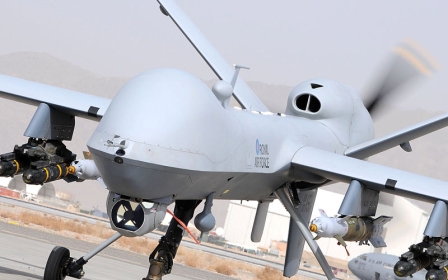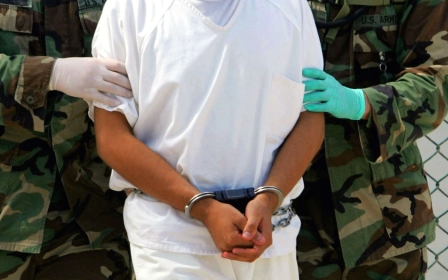UK personnel 'could face murder trials' over drone strikes, MPs warn

The UK’s drone programme is putting civilian lives in danger and exposing personnel to the risk of being prosecuted for murder because the government has not established a "clear policy and sound legal basis" for use of unmanned weapons, a group of parliamentarians warned on Tuesday.
The report by the All Party Parliamentary Group (APPG) on Drones said that the UK’s involvement in the US-led campaign against the Islamic State (IS) group in Syria and Iraq since 2014 had “raised some serious questions about the legality, efficacy and strategic coherence” of the UK drone programme.
The UK had previously been regarded internationally as "a model of responsible and ethical use" of drones, but that record was at risk of being compromised, it said.
"Since 2015, the UK appears to have been taking serious risks in its use of drones. Specific concerns have been raised about the government’s shift towards a policy of 'targeted killing' as well as the legality of UK assistance to partner operations - and particularly that with its closest ally, the US," it said.
“The APPG argues that there is a political and ethical imperative for the government to review and clarify its procedures for using drones and all the multi-national systems that back them up, lest ambiguities in the current position leave the UK dangerously exposed to legal challenges arising either from its own direct use of drones, or effective complicity in their use by others.”
Drone deaths
Parliamentary concerns about the use of drones were raised in August 2015 when two British citizens accused of fighting for IS, Junaid Hussain and Reyaad Khan, were killed by British drone strikes in Syria.
The killings came at a time when British forces were involved in the US-led campaign against IS in Iraq, but not in Syria because British military action there had not then been authorised by Parliament.
The government said the strikes were acts of "self-defence" but has since refused to publish the legal advice on which they were carried out, despite facing a legal challenge from human rights campaign group Rights Watch (UK)
It also faced criticism by Parliament’s Intelligence and Security Committee (ISC) in a report last year, which described the government’s failure to provide documents necessary for it to investigate the circumstances of the killings as "profoundly disappointing".
"Our report shows that without a crystal-clear policy, UK armed drones are flying into trouble. This risks harm to innocent civilians and leaves British personnel wide open to criminal prosecution," said Adam Holloway, a Conservative Party MP and co-chair of the APPG on Drones.
The latest report’s recommendations include calling on the British government to follow the lead of the US and Israel by publishing its policy on the "targeted killing" (assassination) of individuals.
Such a policy should state the legal basis for such killings, the criteria used and precautions applied in selecting targets, and details of oversight mechanisms to ensure that operations are conducted in a manner to avoid disproportionate civilian casualties, it said.
It also called on the UK to publish details of the number of drones it deploys, in line with its reporting of the deployment of conventional, manned aircraft.
Moreover, it cited concerns about the "overly broad definition of combatant" used by the UK, which it said may have contributed to the lack of reporting of civilian casualties by the Royal Air Force in relation to its operations against IS in Iraq and Syria.
'Almost unbelievable'
The British Ministry of Defence has long denied that any civilian casualties had occurred as a consequence of hundreds of Royal Air Force air strikes in Iraq and Syria since 2014, only admitting in May of this year that a civilian on a motorcycle had been "unintentionally killed" when he entered a strike zone in Syria in March.
But that record has been questioned by rights and monitoring groups, which have pointed out that the use of drones by the RAF in Syria has intensified since January, with the number of drone strikes outstripping conventional air strikes over the course of the anti-IS campaign.
In January, a former RAF deputy commander described the government's claim at the time that there was no credible evidence that civilians had been killed as "almost unbelievable".British intelligence and support may also have enabled targeted killings by the US in countries where the UK is not at war, including Yemen, Somalia and Pakistan, the report said.
The UK’s partnership with the US drone programme posed "serious risks", especially under US President Donald Trump’s administration, it said. But it added that similar concerns also arose as a consequence of the UK’s work with "non-traditional partners, such as the Gulf states".
"With no requirement to inform Parliament about such activities - let alone any formal or appropriate oversight - there is considerable danger of the UK being complicit in its partners' unlawful conduct," the report said.
The US has carried out hundreds of drone strikes that have killed more than 1,500 civilians since 2004, according to a report published by human rights watchdog Amnesty International in April. It said that the US had carried out "targeted" strikes in at least seven countries: Syria, Iraq, Yemen, Libya, Somalia, Pakistan and Afghanistan.
Amnesty's report also highlighted the role played by the UK, as well as Germany, the Netherlands and Italy, in support of the US drone programme.
It said that British intelligence-sharing and military bases were "crucial for US drone operations" and that RAF pilots had been embedded at the Creech US air force base in Nevada from which drone operations are conducted.
The APPG report said there was growing concern that the UK was supporting a drone programme in which the US was committing unlawful acts.
"In its current form, assistance to partners is putting the UK and its personnel at risk of criminal liability. UK use of force or assistance to partners in drone strikes outside situations of armed conflict are not protected by combatant immunity, therefore making personnel liable to prosecution for murder."
'Implicated in assassinations'
APPGs are informal cross-party groups of MPs that have no official status in Parliament, unlike the more influential parliamentary committees.
“The UK’s use of armed drones, and the way we work with partners, demands transparency and in-depth scrutiny. The evidence is clear. When Britain shares its bases, intelligence and personnel with drone partners, we risk acting unlawfully. We need to know that the right safeguards are in place,” said Vivien Stern, a cross-bench peer in the House of Lords and co-chair of APPG on Drones.
Jennifer Gibson, head of the assassinations programme at human rights organisation Reprieve, which has highlighted how journalists and other civilians may have ended up on a US “kill list”, called on the British government to “come clean” about its support for the US drone programme.
Gibson cited the publication last month of a report by Parliament's Intelligence and Security Committee detailing the UK’s involvement in the US rendition programme, which revealed that British officials were aware that detainees were kidnapped, mistreated and tortured.
A separate report by the ISC also criticised the British government over its failure to develop a clear policy on rendition.
“In recent weeks it has been laid bare that supporting America’s failed 'War on Terror' means getting caught up in torture, rendition and illegal detention. Now, a parliamentary inquiry has provided overwhelming evidence that Britain is implicated in assassinations as well,” Gibson told Middle East Eye.
“The US’s covert drone programme has killed hundreds of innocent men, women and children far from any battlefield. The government urgently needs to come clean about what supporting this lawless and counterproductive programme entails, and what safeguards are in place to ensure that we are not putting UK personnel at risk of criminal liability.”
Erin Maher, senior legal and policy officer at Rights Watch (UK), said the APPG report showed the "desperate need for public clarity" concerning the legal and policy basis for drone strikes.
"If the Government seeks to use or facilitate the use of lethal force outside of the UK it must adhere to well established rules relating to self defence, which are fundamental to the international legal order," Maher told MEE.
"The inquiry report shows that the current use of drones by the UK and its partners, where a person may be lethally targeted even where they do not pose an imminent threat to the UK, has the potential to undermine the rules prohibiting the resort to international force with catastrophic consequences."
The Ministry of Defence declined to comment and referred MEE to the Foreign Office. A spokesperson for the Foreign Office said: "We do not comment on intelligence matters."
New MEE newsletter: Jerusalem Dispatch
Sign up to get the latest insights and analysis on Israel-Palestine, alongside Turkey Unpacked and other MEE newsletters
Middle East Eye delivers independent and unrivalled coverage and analysis of the Middle East, North Africa and beyond. To learn more about republishing this content and the associated fees, please fill out this form. More about MEE can be found here.




